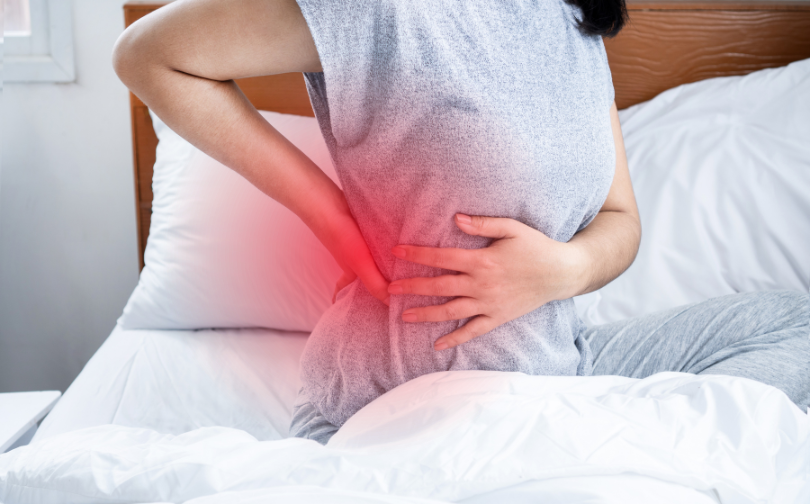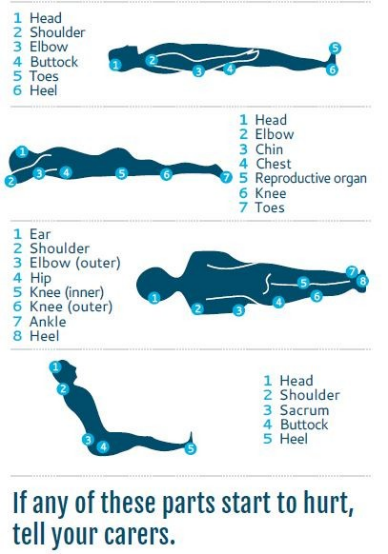What Are Pressure Injuries?

Pressure injuries, sometimes referred to as pressure sores, pressure ulcers or bedsores, are areas of damage to the skin and the underlying tissue caused by constant pressure or rubbing your skin. This type of skin damage can develop quickly to individuals with reduced mobility, such as the elderly or those confined to a bed or chair.

Where do they usually occur?
- The injury can occurs wherever pressure and/or shear is present. They can be caused by the pressure of the person on a surface, for example, laying on the bed or sitting on achair for long periods of time. It can also be caused by pressure exerted by devices and objects pressing against the skin.
- Bony prominences are the most common areas.
If pressure is not relieved, they can develop into a blister or open wound. If not treated, they can get worse and eventually reach deeper layers of skin or muscle and bone.
What are the symptoms?
- Discoloured patches of skin that do not change colour when pressed – the patches are usually red on fairer skin, or purple or blue on darker skin.
- A patch of skin that feels warm, spongy, or hard.
- Pain or itchiness in the affected area of skin.
How do we prevent them?
Think SSKIN:
Surface
- Is the surface such as mattress or cushion in good quality?
- Do we need special overlays? For example, special mattress, cushion, gel pads or heel elevating boots, etc.
- Sheets and clothing should be dry and smooth with no wrinkles.
- Avoid clothes that have thick seams, buttons or zippers that press against your skin and do not wear clothes that are too tight.
- Keep your clothes from bunching up or wrinkling in areas where there is any pressure on your body.
Skin
- Inspect the skin, especially bony prominences, for any discoloration.
- When washing, use a soft sponge or cloth. Do not scrub hard. Use neutral cleansers to prevent dehydrating the skin. Do not use talc powder or strong soaps.
- Use neutral moisturizing cream and skin protectants.
- Protect susceptible areas with Sanyrene.
- Sanyrene, presented in a spray bottle, is a 100% natural product. It is a skin care oil, rich in fatty acid glycerides that makes the skin more supple (elastic, resilient, flexible, and able to endure strain without being permanently injured) by means of its emollient effect (non-cosmetic moisturiser to optimize hydration and avoid skin breakdown). It also helps to maintain skin oxygenation when the skin is pressed.
- Spray once on the desired area and spread the oil gently with your fingertips for about a minute, without massaging or rubbing.
Keep moving
- Try to stay active if possible.
- If you are in bed, change your position every two to four hours, moving between your back and sides.
- Use pillows or cushions to stop knees and ankles from touching each other.
- If sitting up in bed, be aware that sliding down the bed can cause a pressure injury to your bottom and heels.
- Heels should always be elevated from the surface.
- If you are in a chair, lean forward or sideways for a few minutes every half hour.
- Avoid sliding and dragging self when transferring out of chairs and bed.
- Maintain head of bed below 30 degrees and raise knees slightly to limit sliding.
- Do not put pillows under your knees. It puts pressure on your heels.
Incontinence (Moisture)
- If possible, try to void at regular intervals.
- If uncontrollable, get help to clean the area immediately and use a good barrier cream or spray.
- Perspiration, especially during times of high temperature (environment or body) can also cause skin breakdown.
Nutrition
- Make sure you have a healthy, well-balanced nutrition and drink plenty of fluids.
- If necessary, refer to a nutritionist to help you in your diet and provide supplements.
Content and information in this article are provided by Sanyrene - Urgo Medical, and are for informational purposes only. For any doubts, please consult a healthcare professional.


